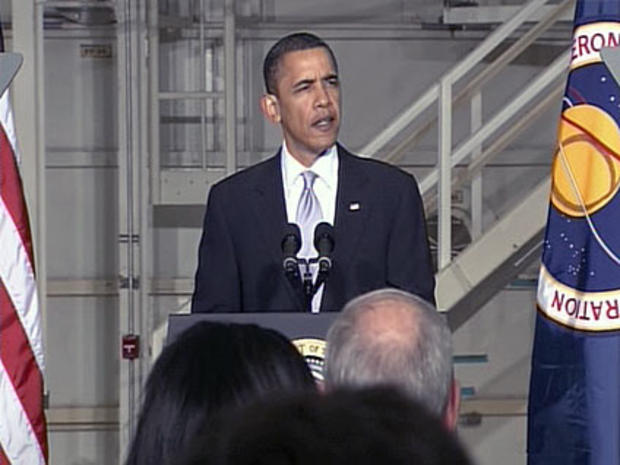Obama: NASA Agenda Should be More Ambitious
Updated at 3:55 p.m. ET
Facing criticism for cancelling NASA's Constellation program, a project that intended to put Americans back on the moon, President Obama said today at the Kennedy Space Center that "the bottom line is, nobody is more committed to manned splace flight, to human exploration of space, than I am."
He added, "But we've got to do it in a smart way, and we can't keep on doing the same things we've been doing."
The likes of Neil Armstrong, the first man to walk on the moon, have criticized Mr. Obama for scrapping a plan that has already cost the government more than $10 billion. The president said today, however, that Constellation was over budget and behind schedule. More bluntly, he added that its mission was outdated.
"We've been there before," Mr. Obama said with respect to plans to return to the moon. "There's a lot more of space to explore and a lot more to learn when we do."
The administration's new plans, the president said, including ramping up robotic exploration of the solar system, extending the life of the International Space Station and working with private companies to develop new spacecraft -- to "make getting to space easier and more affordable," Mr. Obama said.
The president has proposed increasing the National Aeronautics and Space Administration's budget by $6 billion over the next five years to accomplish all of this.
"What we're looking for is not just to continue on the same path, we want to leap into the future," Mr. Obama said. "We want major breakthroughs, a transformative agenda for NASA."
NASA should accelerate its pace of innovation, the president said, specifically citing research on a new heavy-lift rocket for eventual manned flights. The administration wants the space program to finalize a rocket design no later than 2015, which is at least two years earlier than previously planned. Furthermore, Mr. Obama said, the rocket's designers should have the highest standards possible.
"We want to look at new designs, new materials, new technologies that will transform not just where we can go, but what we can do when we get there," he said.
But unlike the programs of the past administration, Mr. Obama said, "we are setting a course with specific and achievable milestones." Those include sending astronauts to an asteroid for the first time, he said. And by the mid-2030's, he said he expects NASA to send astronauts to orbit Mars and return home safely.
"And a landing on Mars will follow, and I expect to be around to see it," the president added.
The space program is an essential part of the fabric of American society, Mr. Obama said, responsible for inspiring generations of scientists and pioneers. He shared a personal anecdote of an early memory, of sitting on his grandfather's shoulders and waving an American flag at astronauts visiting Hawaii.
"Ultimately, if we fail to press forward in pursuit of discovery we are ceding our future," he said.
While a number of lawmakers have raised concerns about the job losses that could result from cancelling Constellation, Mr. Obama insisted today that his plan will create more jobs. But to address the concerns, he announced a new initiative to develop a plan for regional job creation.
